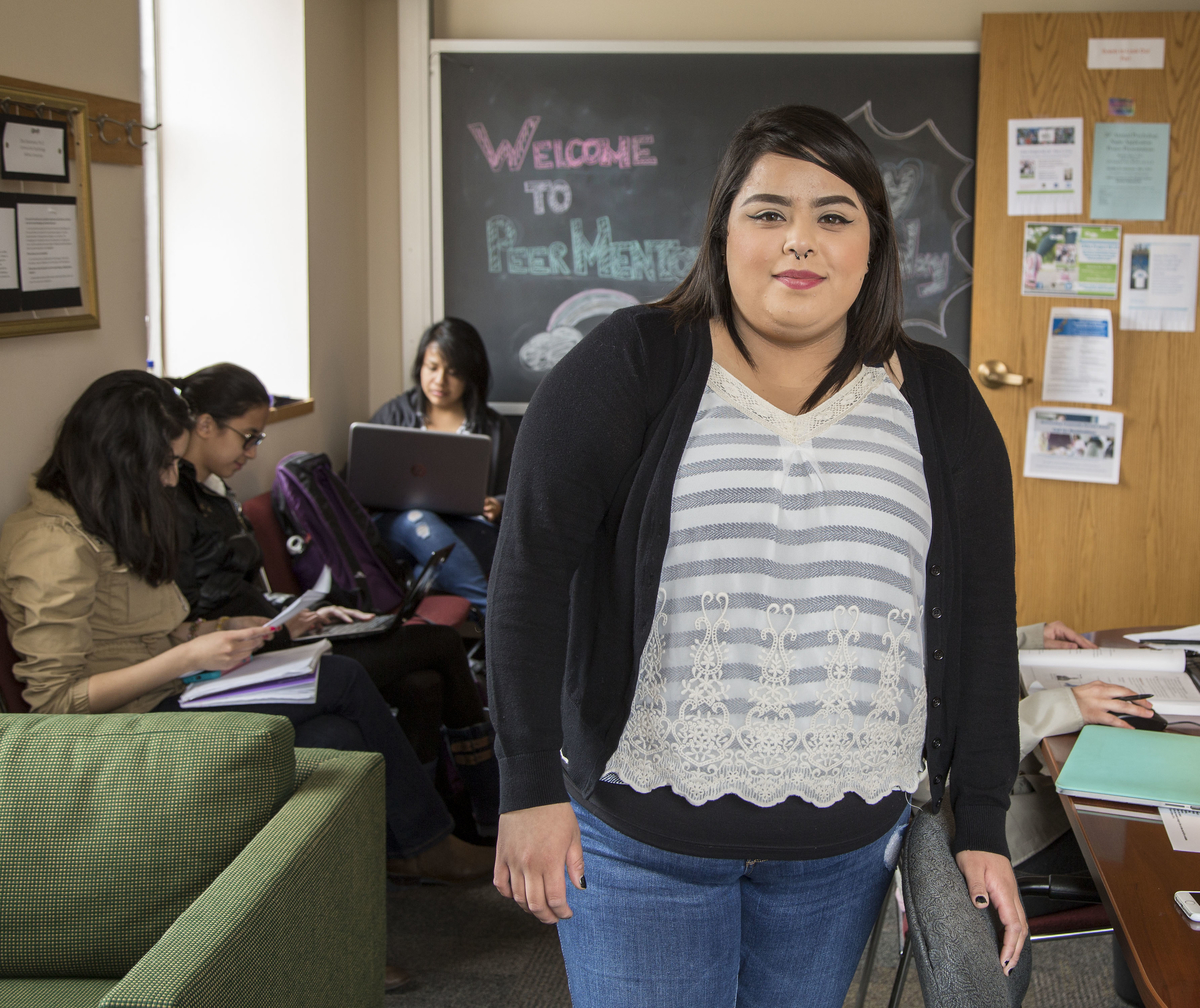 Benita Figueroa will graduate from DePaul University with a BA in psychology this June. Dedicated to helping in her community, here she is pictured in the peer mentoring office at Byrne Hall where she helps fellow students with questions they might have about classes, graduation and even study tips. (Photo by Jamie Moncrief)For Benita Figueroa, the definition of success is not about how much money or how much power she has; it’s about how many young lives she can impact.
Benita Figueroa will graduate from DePaul University with a BA in psychology this June. Dedicated to helping in her community, here she is pictured in the peer mentoring office at Byrne Hall where she helps fellow students with questions they might have about classes, graduation and even study tips. (Photo by Jamie Moncrief)For Benita Figueroa, the definition of success is not about how much money or how much power she has; it’s about how many young lives she can impact.
It was during her junior-year capstone class at Chicago Lights that she discovered her passion for giving back to her community as a youth mentor. Chicago Lights is a nonprofit organization that supports education for youth who face the challenges of poverty through services such as tutoring and mentoring.
After her capstone class was complete, Figueroa decided to continue volunteering at Chicago Lights. “I felt it was important to stay involved in the program because there is a real need for youth to have stable and consistent minority mentors in their lives,” she said. “I hope to be that useful resource for them as someone they can relate to and get advice from.”
She plans to continue working and volunteering in local communities after graduation.
When Figueroa crosses the commencement stage in June, the psychology major in the College of Science and Health will be a first-generation college graduate in her family. With a full-time job and college course load, she said it is an accomplishment she could not have reached without the support of her friends and family.
DePaul’s commitment to community ignites passion
Figueroa was a sophomore at Harold Washington College, a community college in Chicago, when she decided she wanted to transfer schools and pursue a degree in psychology.
As Figueroa was applying to local universities, she didn’t know what she was looking for, but something clicked when she toured DePaul’s campus — the sense of community and emphasis on giving back.
She found it refreshing that volunteering in the community was talked about as much as the curriculum and immediately knew which university she wanted to attend.
“I knew then that it was something I wanted to be a part of and something I wanted my academic role to reflect,” she said.
In addition to volunteering with youth at Chicago Lights, Figueroa also dedicates her time to mentor other students in DePaul’s Psychology Department two days a week. Learning from her own experiences, she has become a welcomed resource to her peers.
As a peer mentor, she helps other students with everything from applying for graduation and graduate school to switching majors and giving study tips.
“It is very rewarding to know I’ve helped someone decide their future plans and possibly have had some sort of impact on their academic journey,” she said.
Psychology: Helping the business and the person
On top of going to school, Figueroa works as a full-time manager in the logistics department at Target. It is there that she is able to put her psychology courses into practice and apply her skills in a business setting. “I’ve learned to use psychology from a corporate perspective so that both the business and the person can be successful,” said Figueroa.
“Psychology has helped me to better understand the people I work with; it has made me more approachable, flexible and adaptable as a manager,” she added.
Figueroa has flourished during her time at Target, quickly rising in the ranks from sales person to manager. Her creativity, ability to lead and willingness to take initiative have prompted her supervisors to give her more responsibility and autonomy.
“I feel that leading by example is something that has to happen for any company to grow,” she explained. “While meeting our sales goals is always a priority, being a role model for my team and making sure my employees are also succeeding is incredibly important to me.”
Breaking the glass ceiling(s)
After graduation, Figueroa hopes to use her experiences and knowledge to work with youth in her community. “Even if I impact the path of one person’s life for the better, I will feel like a successful person,” she said.
After establishing a stable career, Figueroa plans to go back to school to obtain a master’s degree and possibly explore the clinical side of psychology.
“I’ve always been curious about people who come from the same environment and background, but have completely different outcomes,” she said. “That’s an area I’d like to explore further and why I decided to major in psychology to begin with.” She credits her mom for teaching her to “go against the grain and to question why things are the way they are.”
For Figueroa, graduating from DePaul with a Bachelor of Arts degree in psychology means that she has accomplished something that a lot of people told her would be difficult. She agrees that it was tough — she sacrificed time with friends and family and pursuing other passions to prioritize school — but is a stronger and better person for it.
“My degree gives me the confidence to go out into the real world and be a role model in my community, because being a minority and a women — you have to break through, not one, but two glass ceilings.”
One in a series of stories about graduates from the Class of 2015
###
Media Contact:
Wendy Zamaripa Smit
wsmit@depaul.edu
312-362-7749